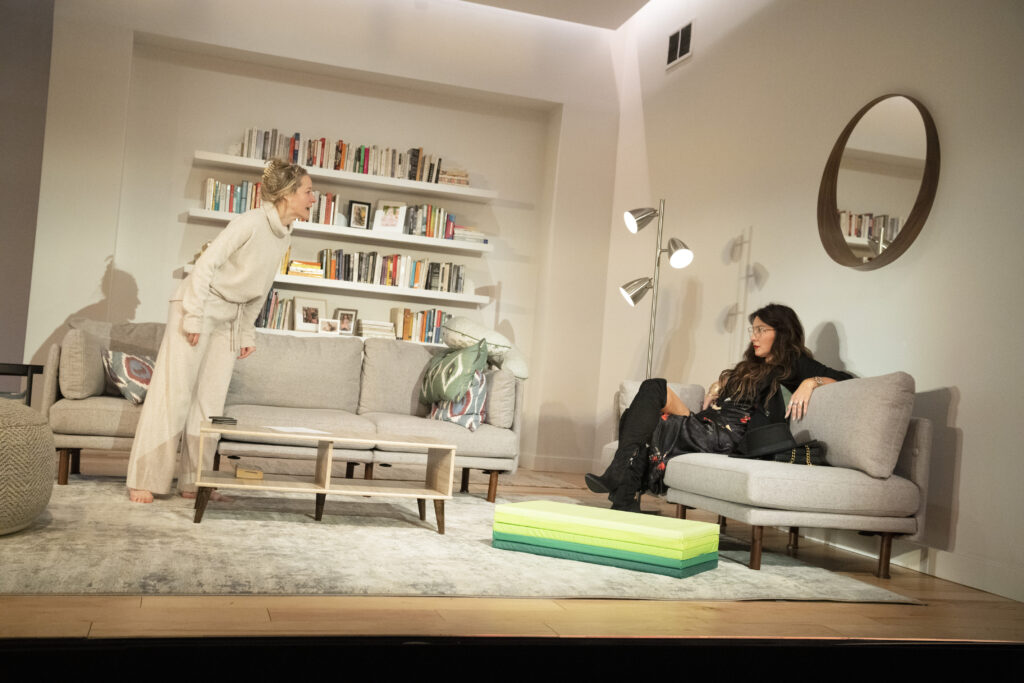By Stuart Miller . . .
The title character of Lucy is rarely on stage and her infant brother, Max, is completely absent. Yet they stir up a storm of emotions in the two women– Mary (Brooke Bloom), the children’s purposely single mother, and Ashling (Lynn Collins), the perpetually youthful nanny she hires– who start as uneasy allies before entering an unnerving cold war for control of the household.
Playwright and director Erica Schmidt, best known for directing classics like “Cyrano” (starring her husband Peter Dinklage) and “Macbeth,” seems to have a strong dose of Albee and of Pinter in her soul.
The play is largely as taut as the tightrope these women seem to be navigating — it was clear from the audience’s reactions during the play and comments afterward that I was not the only one who felt off-balance and uneasy the entire time. Even the laughter was hesitant and uncomfortable, with everyone waiting to see if things would resolve or if the tension would just keep escalating. Until an ending that is flat and anticlimactic, Schmidt masterfully continues the slow build. She’s aided by convincing portrayals from both Bloom and Collins who find layers beneath the archetypes they are playing.

The play works so well because our allegiances shift between the two women or sometimes vanish altogether. Mary loves her children and is committed to their well-being but she’s also committed to her work, which leaves her absent and when she’s around she craves routine and order to manage everything just so. The result is a rigid woman who seems to be repressing most of her emotions.
Despite Ashling’s sterling resume and largely glowing references, Mary should have seen this was not a good match, but she was desperate to find someone willing to fit her exact schedule. (Desperate enough to cave on fair pay and vacation and health care that she, a white woman of privilege, had managed to avoid providing to her previous nanny.)
Ashling is a free spirit– her flowery and colorful outfits are a stark contrast to Mary’s bland attire and she travels and has wild sex with a rock star on her nights off. Her devotion to a career as a nanny seems to have skewed her sense of self; moms and dads in the audience may cringe when she describes herself as a “co-parent,” but will certainly turn against Ashling when she willfully — even gleefully — goes against Mary’s (admittedly too strict) demands.


Most worrisome is that Ashling has always been a nanny for boys, well past the point that feels appropriate: she’s only free now because her previous charge, Henry, has turned 15. (Imagine how Henry must have felt with a clingy nanny picking him up from high school.) And she loves her boys, so, so much–both teen Henry and baby Max get described as “sweetie, sweetie, sweetie boy” in a way that will make your skin crawl.
Over time, Ashling manipulates, exploits and outright lies (about the musk she is or is not wearing and the meds she does or does not take), but she does it with a beatific smile and an energy that at first seems magnificently playful but is revealed to be dangerously manic.
So where does that leave Lucy?


Lucy herself is played by an adorable Charlotte Surak, who jumps joyously when happy, stomps around when not and spills first the milk and then the cereal right when her mother is stressed out about the nanny being late. In other words, she seems like a perfectly normal six-year-old.
And yet, she provokes something in both women. During the job interview Mary says of her own daughter, “I feel like her struggles are greater than her strengths in many ways. She could turn out to be a really, annoying person if I don’t stay on top of it. I never felt anger in my life until I had her – honestly – not that gut punch out of nowhere scream at the top of your voice rage? She brings that out in me. When she was two I was sure our neighbors would call child services. I can’t control her – not really – and – she’s SO MUCH… she’s so – so – tempestuous.”
A normal nanny would probably start heading for the exit at that point, getting away from both this mother, who needs an exorcism of her own, and her tiny Regan, who may start spinning her head around at any moment. But Ashling seems to see this as an opportunity to divide and conquer. Soon enough, she’s complaining about Lucy’s “attitude” and saying, “She screamed at me with so much anger …rage … really…”
We never see any of this. Neither woman has any self-awareness so it’s impossible to trust their view of Lucy. So we are left with the unsettling sense that this poor girl is not what they say but is being shaped by their warped perspectives, regardless of how the struggle being the adults ultimately plays out.
Lucy is playing at Audible Theater’s Minetta Lane Theatre (18 Minetta Lane) through February 25th. It runs 1 hour and 40 minutes with no intermission and no chance to relax or recover.
Photos: Joan Marcus


















